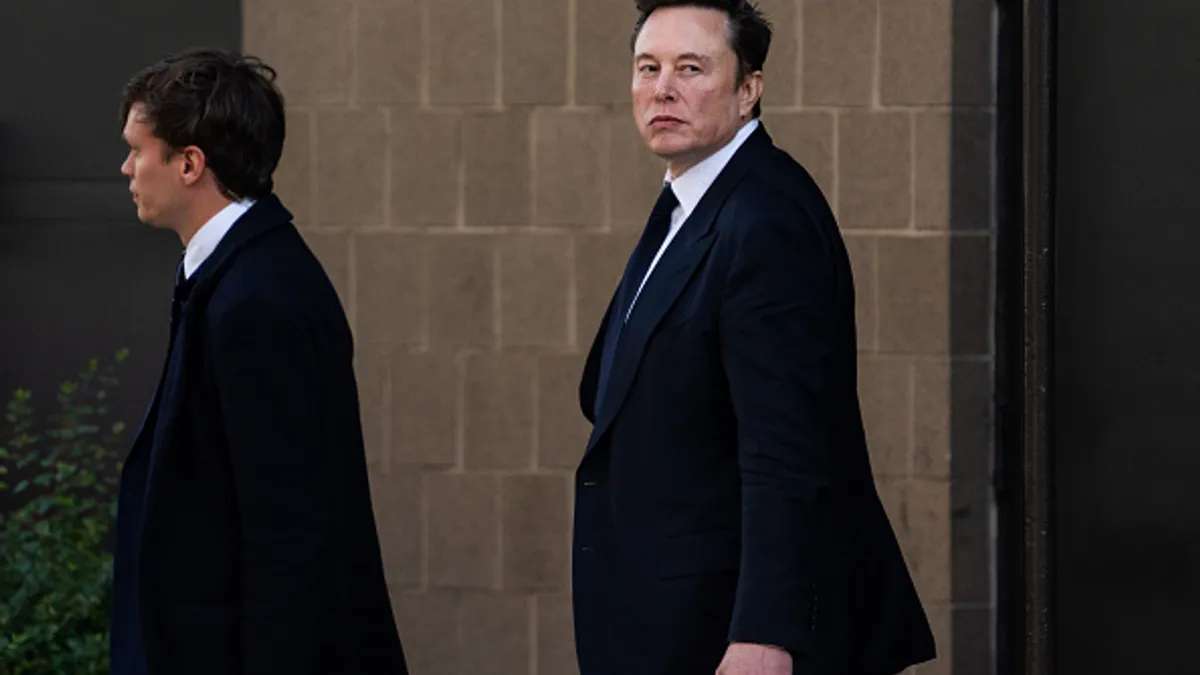Dive Brief:
- Chancellor Kathaleen McCormick of the Delaware Chancery Court ruled against a record pay package for Tesla CEO Elon Musk for the second time Dec. 2 when she dismissed as baseless a vote the company held earlier this year to show a majority of company shareholders support the package.
- Musk and Tesla, she said, “have no procedural ground for flipping the outcome of an adverse post-trial decision based on evidence they created after trial.”
- McCormick also awarded a record $345 million in fees to the prevailing plaintiffs’ counsel. The attorneys had sought fees in Tesla shares that amounted to 10% of the pay package, which would have resulted in compensation for the legal work equal to about $5.6 billion. But McCormick said this was a windfall outside the bounds of reason. “In a case about excessive compensation, that was a bold ask,” she said.
Dive Insight:
McCormick first ruled against Musk’s equity-based pay package in January, when it was valued at about $56 billion, on the basis it was put together by Musk himself — a conflicted controller — and supported by board members in a breach of their fiduciary duty.
This time around, McCormick was responding to a motion by Musk and Tesla to review that earlier decision in light of the shareholder vote the company held on the pay package in June to ratify it. In that vote, almost three-quarters of the company’s shareholders said they wanted Musk to get the pay, which would be the largest amount any officer of a publicly traded company has ever received.
In her ruling, McCormick gave multiple reasons why the vote was no reason for reversing her decision.
“The large and talented group of defense firms [working on Musk’s behalf] got creative with the ratification argument, but their unprecedented theories go against multiple strains of settled law,” she said.
First, there’s no procedural ground for flipping the outcome of an adverse post-trial decision based on evidence that’s created after trial, she said. Tesla made the request in part under a Chancery Court rule that allows a court to reopen the trial record after a post-trial decision, but that rule is for the introduction of newly discovered evidence, not newly created evidence.
“The Stockholder Vote did not exist at the time of trial,” she said. “Defendants created it after the Post-Trial Opinion.”
Second, Tesla’s effort to present the shareholder vote as common-law ratification came too late, she said. Since common-law ratification is an affirmative defense, it’s a misuse of the defense to raise it for the first time after a post-trial opinion, she said, especially since the shareholder lawsuit against the pay package was brought six years ago. “Wherever the outer boundary of non-prejudicial delay lies, Defendants crossed it,” she said.
Third, Tesla failed to follow the procedural steps that might have allowed the vote to have legal weight as a form of “common law ratification.” For the vote to have had legal weight, the company would have had to set it up under what’s known as the MFW doctrine, which governs procedures for dealing with a conflicted-controller transaction. But it didn’t do that.
MFW is shorthand for a 2014 U.S. Supreme Court case, Kahn v. M&F Worldwide Corp., which provided ground rules for certain types of transactions involving a controlling shareholder. Musk in this case was deemed a controlling shareholder by the court in its earlier January decision.
“Defendants’ failure to adhere to the framework for securing stockholder ratification in a conflicted-controller context offers an independent basis for rejecting the Ratification Argument,” she said.
Fourth, even if the stockholder vote were to have legal weight, there were material misstatements in the proxy statement that bar the vote from having a ratifying effect.
Among the misstatements, she said, was a claim that the vote would “extinguish claims for breach of fiduciary duty” and correct disclosure deficiencies that were found by the court in the January ruling.
McCormick said any one of the four defects would defeat the company’s motion to revise, but when taken together, “they pack a powerful punch.”
On his X platform, Musk slammed the decision. “Shareholders should control company votes, not judges,” he said. Tesla said it would appeal.











